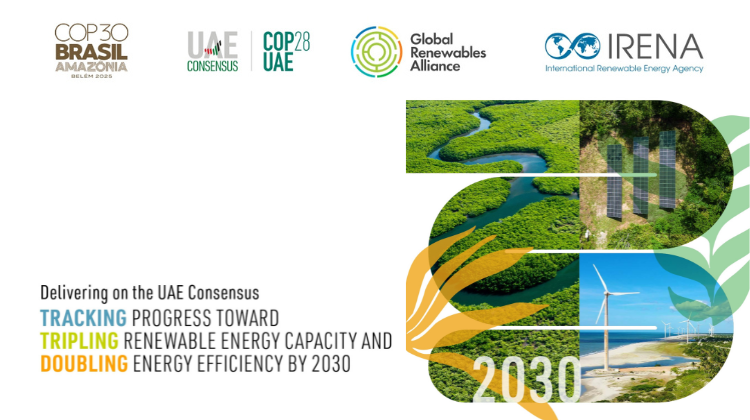In 2024, global renewable capacity additions reached an unprecedented 582 GW. Yet this is still not enough to stay on track for the COP28 UAE Consensus target of tripling renewables to 11.2 TW by 2030. Meeting that goal now demands a staggering 1 122 GW of added capacity every year from 2025 onward, requiring annual growth to accelerate to 16.6% through the decade, according to the second official tracking report on the landmark energy goals set by the UAE Consensus at COP28.
The progress report, Delivering on the UAE Consensus: Tracking progress toward tripling renewable energy capacity and doubling energy efficiency by 2030 also highlights that energy efficiency is an equally great concern. Global energy intensity improved by just 1% in 2024, far below the 4% annual gains needed to meet the UAE Consensus goal and keep the 1.5°C target alive.
The report calls for urgent action to:
- integrate renewable targets into national climate plans (NDC 3.0) ahead of COP30 in Belém;
- double collective NDC ambition to align with the global renewables goal; and
- scale investment in renewables to at least USD 1.4 trillion per year in 2025–2030 –more than doubling the USD 624 billion invested in 2024.
“The clean energy revolution is unstoppable.”
Renewables are deployed faster and cheaper than fossil fuels – driving growth, jobs, and affordable power. But the window to keep the 1.5°C limit within reach is rapidly closing. We must step up, scale up and speed up the just energy transition – for everyone, everywhere.
“The world has broken renewable capacity records, but records alone will not keep 1.5°C alive.”
Renewables are not just the most cost-effective climate solution; they are the biggest economic opportunity of our time. This report shows the path: accelerate deployment, modernise grids, scale clean-tech and strengthen supply chains. Every dollar invested brings growth, jobs and energy security. As the custodian agency tracking progress toward the global renewables goal, we call for greater ambition. By raising targets, mobilising finance and deepening cooperation, major economies can lead the energy transition and make COP30 a milestone.
“The private sector is driving the energy transition, providing three-quarters of global clean energy investment.”
Our industries, led by wind, solar and hydropower, are already delivering growth, jobs and security. What we need now are long-term government plans that match national ambitions; we need pipelines that deliver projects. Plans must deliver enabling action on grids and storage and help maximise the benefits of the energy transition. This report shows that the march to renewable energy abundance is underway – and it’s time for us to accelerate.
The world’s major advanced and emerging economies must take the lead, according to the recommendations of the new report. G20 nations are projected to account for over 80% of global renewables by 2030, with the richest developed economies of the G7 expected to shoulder a leadership role by raising their share to around 20% of global capacity within this decade.
Major global economies must also deliver on climate finance, meeting the USD 300 billion annual floor of the new collective quantified goal (NCQG) and scaling up towards the aspirational USD 1.3 trillion confirmed at COP29 in Azerbaijan.
Beyond renewables, the report underlines the urgent need for investment in grids, supply chains, and clean-tech manufacturing for solar, wind, batteries and hydrogen.
While renewable energy investments grew by 7% in 2024, actual disbursements remain far below the levels required to build robust project pipelines and accelerate construction. As to supply chains, fair and transparent trade practices must be ensured for critical renewable energy technologies and international co-operation pursued to safeguard trade corridors for key materials and components.
Furthermore, strategic investment in modernising and expanding electricity grids is the essential foundation for integrating new capacity and strengthening energy security. Between now and 2030, an estimated USD 670 billion must be directed each year towards grids, with further investment required to rapidly scale up energy storage solutions, facilitate renewable integration and safeguard grid stability.
IRENA_COP30_GRA_Tracking_the_UAE_Consensus_2025
































